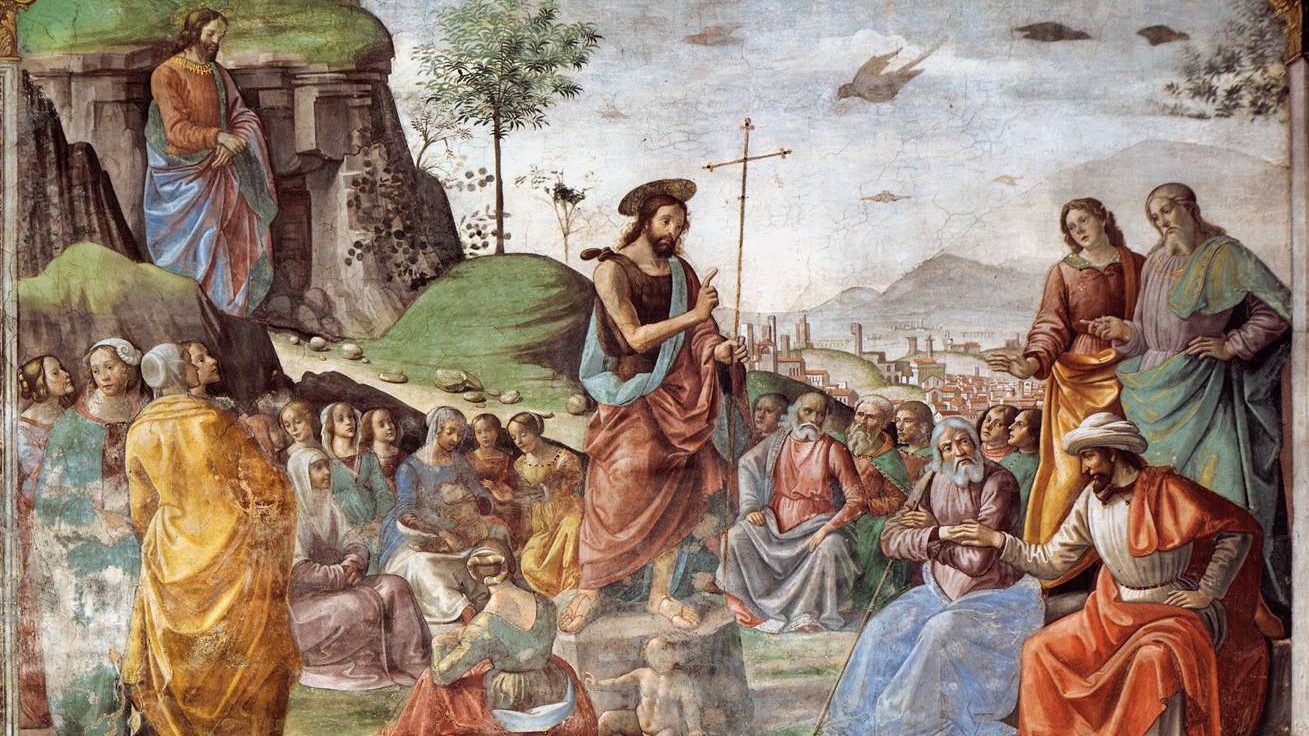Rejoice! The Lord is Near
Third Sunday of Advent (C)
The third Sunday of Advent is called Gaudete Sunday, from the Latin word for “rejoice.” We have reached the halfway point of Advent, and rejoicing at the coming of the Lord is clearly the theme of the scripture readings for this Sunday. The prophet Zephaniah tells us to “shout for joy” (Zep 3:14) because “the King of Israel, the Lord, is in your midst” (Zep 3:15). The responsorial psalm is taken from the prophet Isaiah: “Cry out with joy and gladness; for among you is the great and Holy One of Israel” (Is 12:6). In the epistle, St. Paul instructs us to “Rejoice in the Lord always,” and just in case we missed it, he says, “I say it again: rejoice! . . . The Lord is near” (Phil 4:4-5).
But when we come to the gospel we find John the Baptist warning about the chaff being separated from the wheat to be burned in unquenchable fire (Lk 3:17). That image doesn’t seem to fit with the theme of rejoicing: yet his preaching is called “good news” (Lk 3:18). John’s message is indeed good news and cause for rejoicing if we understand its implications.
We rejoice because God is with us, but the dwelling of God among his people cannot leave things the way they were before. God’s presence changes everything. The coming reign of justice requires a reckoning, with the righteous being blessed and the wicked being punished; hence John’s warning. John tells us what we need to do to be among the blessed (from the Latin word benedictus, meaning “happy”). We need to share our blessings with others (cf. Lk 3:11). We need to listen to St. Paul and treat one another with kindness (cf. Ph 4:5). As part of his message of repentance to prepare the way of the Lord, John the Baptist calls on the rich to share their excess with those less fortunate (Lk 3:11). Soldiers and tax collectors are told to be content with their wages and not unjustly extort others (Lk 3:13-14).
It is easy to see how this is good news for the poor and oppressed. But it is also good news for the wealthy and the oppressors! It is a reminder that wealth, power and status in society are not — indeed cannot be — the source of true happiness. If we want to know real and everlasting joy, we need to seek first the things that are above (cf. Mt 6:33).
Our joy does not depend upon the things of this world. As stressful as the end of the semester can be, it’s good to know that true joy does not come from making good grades, passing exams, or getting into the right grad school. Joy comes from recognizing the presence of the Lord among us and living in the light of that presence. What this looks like is described by St. Paul in the second reading. It is a life of kindness, prayer, thanksgiving, and peace (cf. Phil 4:4-7).
Rejoice in the Lord always. I shall say it again: rejoice! Your kindness should be known to all. The Lord is near. Have no anxiety at all, but in everything, by prayer and petition, with thanksgiving, make your requests known to God. Then the peace of God that surpasses all understanding will guard your hearts and minds in Christ Jesus.
Philippians 4:4-7
During one of our times of Eucharistic Adoration last week, I was struck anew by the fact that God is here with us! What a strange thing to consider, that God is right here, in the Eucharist, in our little chapel in Cullowhee, just a stone’s throw from the center of campus. Do we really appreciate what that means? If we did, we’d need to tear down this chapel to build a cathedral! I thought of the 10,000 students at WCU, all searching for something. They are looking for truth. They are looking to find their way in the world. They seek direction and meaning and purpose for their lives. They long to be happy. And the ultimate answer to everything they seek is right here. If only they knew.
And then my thoughts turned to Bethlehem and Christ’s humble birth in a manger, hidden away in a cave. I thought of all the citizens of that town, and of nearby Jerusalem and the people of God all throughout Judea and Israel who were looking for a Messiah. They were longing for one who would liberate them from oppression, who would give them peace and justice and set things right. And here was God among them, the Savior, wrapped in swaddling clothes. If only they knew.
God comes to us in hidden, silent, and often unexpected ways. He is always near for those who seek him (cf. Ps 145:18), but we can miss his presence if we are too concerned with worldly things. Advent comes to us in the midst of all the anxieties of the world and reminds to turn our attention to the things of heave so that we might recognize — and rejoice in — God’s presence among us.
Have a blessed end of the semester, and a joy-filled Christmas this year!

